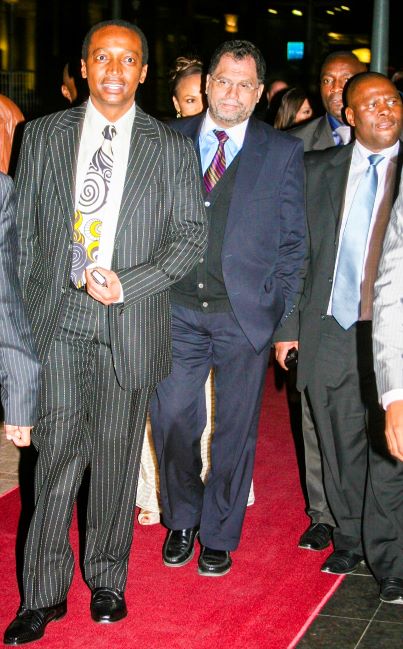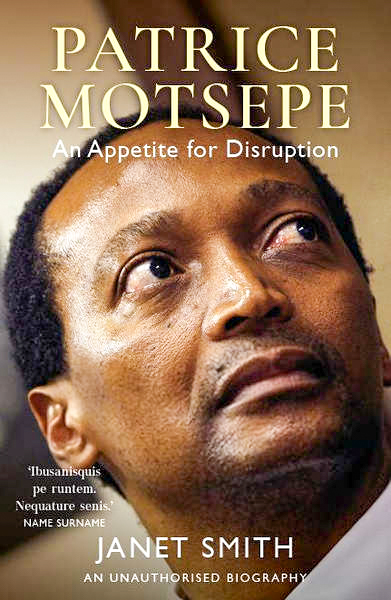“DON’T EXPECT a painted woman to remove a photo of a man with exposed penis, it helps her get through lonely nights,” read the tweet, posted by @PatriceMotsepe on 25 May.
Politics – wrote author, Janet Smith, in a chapter from her new tome, Patrice Motsepe – An Appetite for Disruption – had long tried to touch Motsepe, as was the case in May 2012 when he made headlines without breathing a word.
The City Press had published a photograph of artist, Brett Murray’s artwork, Spear of the Nation, depicting then president, Jacob Zuma’s exposed manhood, on its website – prompting some members of the ANC to direct personal obscenity at the editor, Ferial Haffajee.
Haffajee was instantly taken aback by the sexual innuendo of a comment emanating from a fellow WITS alumni of congenial standing! Except that @PatriceMotsepe was a troll masquerading as the real entrepreneur.
Whilst you peruse through Smith’s account – albeit an unauthorized biography – the proverbial phrase, uneasy lies the head which wears the crown, immediately slides into the equation. For, Motsepe might be an African billionaire of note imbued with enviable power (by virtue of being the Confederation of African Football president – that also makes him a vice-president of FIFA) to boot – yet his hallowed status is fraught with ambivalent experiences stemming from grandiose ambition which has tentacles spread into investments in mining, derivatives, new energy, IT, art, banking, soccer, philanthropy, et cetera.
An Orlando East boy – where his equally famous dad, ABC, was a teacher at Orlando High School and an ardent Orlando Pirates FC follower – Motsepe is a close relative of Bakgatla kings and belongs to the royal lineage through the Mmakau clan.
The founder of African Rainbow Minerals propelled through venture capital off the back of Future Mining (a company he had registered in 1994, and with which he started small as a contractor which did the worst job – gleaning dust left over from blasting from inside gold-mining shafts – for mining bosses), Motsepe convinced Anglo’s chief executive of gold and uranium, Bobby Godsell to take a chance on ARM through a R500 000 loan with which he could acquire loss-making mine shafts. (Motsepe recalled Harry Oppenheimer politely asking him: “what makes you think you are going to make money where Anglo has not?”).
The deal with Anglo – which was to go down in history as one of the most important for South Africa’s post-apartheid business recovery – served to underscore the disruptor Motsepe garnered a reputation for in his dealings!
By 2004, he would represent the largest black mining interests in SA history as executive chairperson and controlling shareholder of a group with a market share of R3 889 billion! And if that staggering figure accumulated by an entity makes for impressive consideration, then his personal financial achievement translate to even noteworthy reckoning – with him entering the Sunday Times’ ‘Rich List’ in 2011 with a fortune of R23 billion, amongst a combined R112.2 billion (a tally isolating South Africa’s 20 wealthiest people on the Johannesburg Stock Exchange.) Thus, that propelling him into the Oppenheimers and Ruperts league!
It is in Smith’s book that one comes across the curious term, ‘Philanthrocapitalism’, and the expression could had inspired no ideal a practitioner than Motsepe.
Having become a ‘six zeros’ claimant by the age 40, Motsepe took up US billionaire, Bill Gates challenge in 2013 by joining the Giving Pledge – an initiative where the world’s wealthiest people committed sizeable chunks of their wealth to charitable causes.
A rider defining success breaks it down as: ‘No longer was status a simple function of material wealth. Rather, it became a function of the “value” of what you did with your wealth”.’
Since for the majority of the man-in-the-street Motsepe’s name is synonymous with ‘the game of billions’, it is touching on his role in the sport that the paperback makes for exhilarating reading.
From annexing the majority shares for the total ownership of Mamelodi Sundowns FC to occupying the Confederation of African Football throne (pending which election in 2021 a contestant decried the process as being ‘not too democratic’) – it is his modus operandi which reveals him as a shrewd and, others might argue, brutal operator!
Consider the following: ‘Your mission at CAF is over. Don’t come to headquarters anymore!’ Strategic role players were duly informed via e-mails shortly after his coronation at the entity’s Cairo-based HQ.
And for a proprietor able to afford European managers (the names Hristo Stoichkov and Johan Neeskens come into play), such has been Motsepe’s exacting standards that his realm harbours no tolerance for failure: “If you’re a coach, you’ve got to win. I say there is trouble … very, very serious trouble.”
Such an utterance made after firing some coaches who hadn’t delivered on expectations – and whilst ruing that he was always three months late in firing his coaches! A bent which probably explains why Sundowns has become such a dominant outfit on the local soccer scene!
The personification of royalty in his own terms Motsepe has donned many caps, with at count: NAFCOC president, one of Forbes 100 greatest living business minds (2017), donor to political parties (including the ANC), inter alia.
A WITS LLB graduate who counts among his alumni, Haffajee, Discovery founder, Adrian Gore and UCT Vice-Chancellor, Professor Mamokgethi Phakeng, Motsepe isn’t the thrifty sort – hogging headlines such as: ‘Billionaire buys $1m Picasso at Leonardo DiCaprio gala’, and spending R68 million on a ‘sprawling retreat’ in Bishopscourt, as well as some R120 million on a wine farm around Stellenbosch.
About the author
Janet Smith is a former newspaper editor and the author or co-author of seven books, including three young adult titles, all of which won prizes in the Young Africa Awards. Non-fiction titles of which she was a co-author include Hani: A Life Too Short, The Coming Revolution: Julius Malema and the Fight for Economic Freedom and The Black Consciousness Reader.
Patrice Motsepe – An Appetite for Disruption, is published by Jonathan Ball Publishers.
Images Supplied (Patrice Motsepe- An Appetite for Disruption book cover).


